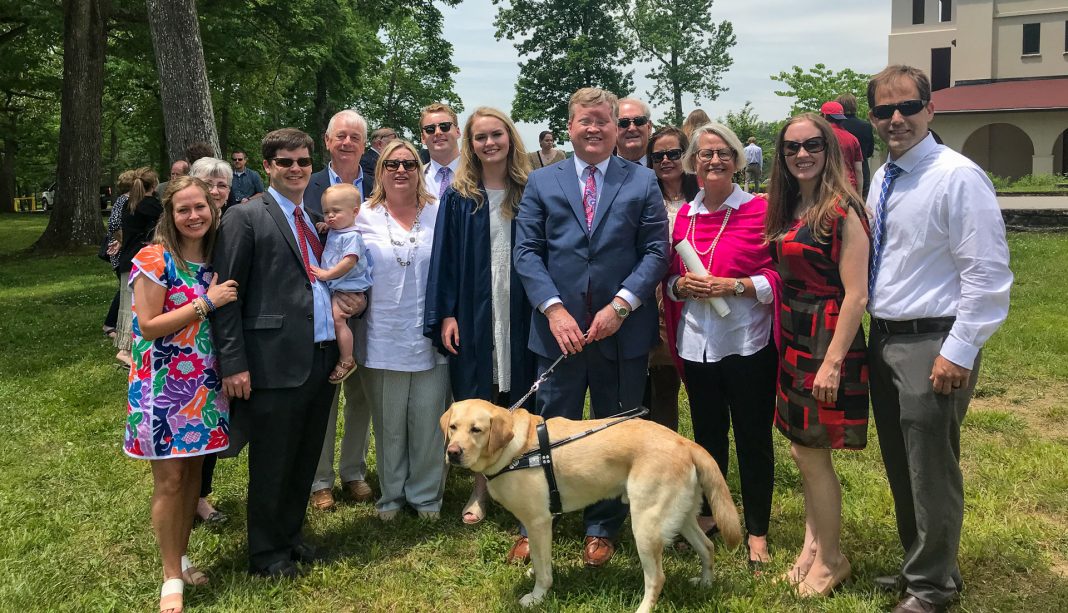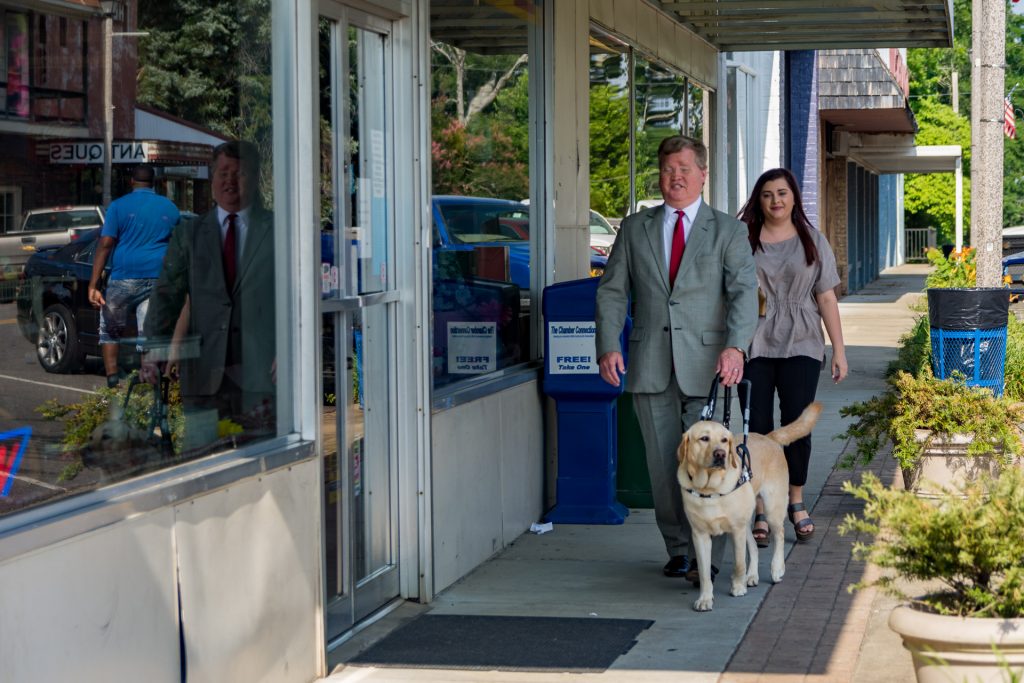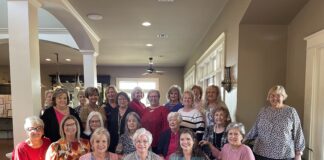The scorching sun of a hot Alabama day in May tested my car’s air conditioning as I pulled up at the law office of Richard M. Kemmer, Jr. P.C. Fortunately shade still existed at mid-morning along Walnut Street’s row of shops in Centreville. A shake-shingled awning and the law office’s southern-front-porch style alcove adorned with hanging plants enhanced the thought that it might be more comfortable inside. The simple and thin writing on the glass let me know this was no ostentatious, self-important ambulance chaser.
If anything, Richard M. Kemmer (his friends call him Mitch) is the opposite of a boisterous billboard-attorney type, which was why I had also invited his wife, Bibb County Probate Judge Stephanie Kemmer, to sit in on our interview. My hope was that Mrs. Kemmer would tell me things that Mitch was perhaps too humble to say about himself. My hunch proved correct.
Mitch Kemmer is perhaps one of the few men I’ve met in my travels who has an honest right to boast of his achievements. Mitch is an At Large Bar Commissioner for the State of Alabama, a Fellow in the Alabama Law Foundation, the City Attorney for both Centreville and West Blocton, and maintains a private law practice out of his office in Centreville. He has also been recently reappointed by Governor Ivey to the Board of Trustees for the Alabama Institute for Deaf and Blind (AIDB).
Yet, he doesn’t brag. To him it’s all just part of a life that’s turned out a little differently than anticipated. It’s all a part of staying his own course, despite the hurdles and setbacks. If you don’t know, Mitch Kemmer is blind. But he wasn’t always without sight. A near-fatal car accident in December 2000, left him completely blind … at 42 years old.
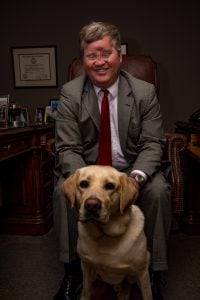 My first experience with Mitch was at a Centreville City Council meeting I was covering. He came in with his guide dog, Carl, and sat at the council table. It wasn’t long into the meeting, after a few legal questions were asked of him by council members, that I thought, “This has got to be an incredibly smart guy. He has all that stuff in his head. He doesn’t even have benefit of modern cheats to look something up on his phone.” Mrs. Kemmer concurred.
My first experience with Mitch was at a Centreville City Council meeting I was covering. He came in with his guide dog, Carl, and sat at the council table. It wasn’t long into the meeting, after a few legal questions were asked of him by council members, that I thought, “This has got to be an incredibly smart guy. He has all that stuff in his head. He doesn’t even have benefit of modern cheats to look something up on his phone.” Mrs. Kemmer concurred.
“After the accident,” Stephanie recalled, “there was a lot of physical rehabilitation. But he did a lot of things to get back to the practice of law.
“I remember the first deposition that he was going to be taking. Of course, he prepared like he always does, but I thought ‘Well I’ll sit in’ because I’ve never gone into a deposition without pages and pages of notes and questions. And I sat in there, and not only did he know every single question that he thought he was going to ask, but he worked off the information he was being provided. I was in there about 30 minutes and I thought ‘This is a waste of time’ and I just left. Because he had it all, you know? It was all in [his brain] without notes.”
“I would’ve loved to have seen, you know, to see my children, see my wife, my grandchildren, but you know it’s just part of it. I’m very blessed. I have a very good life. I have a very good family and associates that I work with, and so I enjoy every day. I just enjoy living.”
December 27, 2000. Mitch Kemmer decided to take a day off work and take his two oldest children – soon to graduate high school – on a sightseeing tour of his alma mater, the University of Alabama. It had been a rainy and icy day, but all three had a good day of dining out and seeing the town. On the way home to Centreville along Highway 82, the 15-year-old was driving when the vehicle had a blowout. Not panicking, he pulled the car into the median to stop. Instead, they hit an unseen drainage culvert, causing the car to flip. Both children were relatively unharmed, but for Mitch it became a fight for his life requiring 24 units of blood to keep him alive, and leaving him permanently and completely without vision.
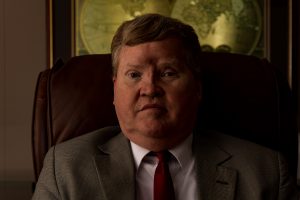 “People have said to me, ‘If that happened to me, I think I would have just curled up and never done anything,’” Stephanie said, “Mitch and I never knew anyone without vision. It’s a very small part of the world that are actually without vision. Even among the visually impaired, it’s a very small number who are completely without vision, which is what Mitch is. He doesn’t have ambulatory or light vision. There are two separate injuries to his eyes: one is an optic nerve injury and one is a retinal injury.”
“People have said to me, ‘If that happened to me, I think I would have just curled up and never done anything,’” Stephanie said, “Mitch and I never knew anyone without vision. It’s a very small part of the world that are actually without vision. Even among the visually impaired, it’s a very small number who are completely without vision, which is what Mitch is. He doesn’t have ambulatory or light vision. There are two separate injuries to his eyes: one is an optic nerve injury and one is a retinal injury.”
Mitch’s four children gave him incentive to keep moving. He was determined to give them a good example – to not let them see him being unproductive, and to be sure they saw him serving and benefiting others.
“Over the years as the kids have won things or had opportunity to speak about their achievements, they’ve always referred back to that and how he inspired them,” Stephanie went on, “and that’s important. It all starts with your family.
“He had a lot on his plate when it happened, and he rose to the occasion and found every way he could to adapt.”
“That’s part of what I have to deal with in my law practice,” Mitch put in. “There are a lot of gadgets and gizmos that can assist me, but I primarily rely on a computer that speaks to me. I know enough braille to adjust the microwave,” he joked. Learning to read in braille at 42 proved a challenge, and remains a “slow going” endeavor.
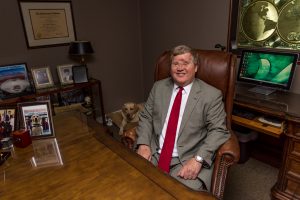 His computer uses a program called Window Eyes, which will read to him in real time anything in a selected window on the screen. He sends rough notes or dictates to his staff, who then type up whatever documents he requires. Then he has his computer read those back to him for review. Mitch also uses an iPhone which will talk to him and allows him to access things using Siri. “Siri and Alexa are my buddies,” he laughed.
His computer uses a program called Window Eyes, which will read to him in real time anything in a selected window on the screen. He sends rough notes or dictates to his staff, who then type up whatever documents he requires. Then he has his computer read those back to him for review. Mitch also uses an iPhone which will talk to him and allows him to access things using Siri. “Siri and Alexa are my buddies,” he laughed.
Getting back to his normal life after the accident may have been more daunting a task than most of us can imagine. Mitch recalled the time: “I had to go to guide dog school for a month. And I had a couple of surgeries.” After years of working to overcome physical issues from the wreck, and months at the Alabama Institute for the Deaf and Blind in Talladega, Mitch made his way back work in the spring of 2003.
Now, years after benefiting from the adult education programs at the Alabama Institute for Deaf and Blind, Mitch Kemmer is a member of its Board of Trustees. The board is made up of one individual from each congressional district, each nominated by the Governor of Alabama. Mitch represents District 6, which includes Bibb and Tuscaloosa counties. He was initially appointed three years ago to fill out a term of someone who had retired. After completing that term, he was reappointed to the seat by Governor Ivey. The Senate confirmation for his appointment happened a few weeks ago in Montgomery. The position is more than just a title. After our meeting, Mitch was on the way to a trustee meeting in Talladega that afternoon.
In addition, he was elected by the state Board of Bar Commissioners to be an At Large Commissioner. One of only 9 in the state, the At Large Commissioners are elected by the 75 members of the Board of Bar Commissioners, making it an honor given by his peers. The Board of Bar Commissioners is the governing and policy-making body of the Alabama State Bar. Bibb County has never had a Bar Commissioner … until Mitch.
Mitch is also a Fellow in the Alabama Law Foundation, a position held by only 1% of attorneys in the state. This is an organization that recognizes service to the State Bar, and Mitch was named a Fellow in January of this year.
Having achieved so much is impressive for anyone. Adding the obstacle of being blind in a sight-oriented world and reaching the heights of career Mitch has is downright amazing. It would have to take a toll on anyone, not just physically, but mentally, emotionally, and spiritually.
BV: On a personal level, how have you adapted? I can’t imagine having that sudden total loss of vision. You’ve obviously kept yourself going with your kids as your motivation, but on a core emotional level that had to be hard to deal with for yourself.
Mitch nodded, “It was. And from time to time things occur that frustrate you … countless dance recitals, ball games, and things like that … I would’ve loved to have seen, you know, to see my children, see my wife, my grandchildren, but you know it’s just part of it. I’m very blessed. I have a very good life. I have a very good family and associates that I work with, and so I enjoy every day. I just enjoy living.
“And I’ve got this other child, this guide dog named Carl. He requires a lot of attention.” He’s had Carl for a little over a year now, but Carl is not his first guide dog.
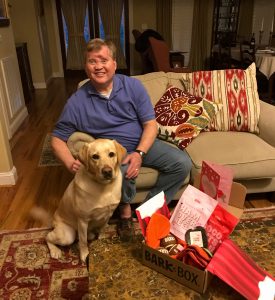
“In 2002 I went to Southeastern Guide Dogs in Palmetto, Florida. I trained and received a black lab named Ernie. Ernie and I worked together for 10 years, then he had to be retired. He suffered an injury and started having some health problems. He lived about another year. It was an emotional thing to lose Ernie. I waited over four years, then decided finally it was time. Our youngest children were graduating high school and going off to college and it was just going to be Stephanie and me at home, so I thought I needed to get a guide dog again.
“Carl has worked out very well. I can walk to work in the morning, but it’s usually too humid to do that. By the time I get here with Carl I would need to go home and take a shower,” Mitch laughed, “But he and I walk home every evening. He walks me to the courthouse. He knows exactly where to seat me in the courtroom, then he gets under the table and waits for me to call him.”
Carl is always being friendly with everyone. “That is one thing that’s different between him and Ernie. He’s actually not supposed to be so friendly, but he’s kind of the concierge of the law office and the courtroom. He goes and greets everyone.”
“Technically, people aren’t supposed to interact with Carl while he’s working,” Stephanie added, “When he has his harness on, he’s working. And they say that distracting a guide dog is akin to putting your hand over the eyes of a driver of a car, because he’s serving as Mitch’s eyes at that point.” She directed herself toward Mitch, “And you’re very lax with that, aren’t you?”
“I have been,” Mitch answered, “I used to have a sign on Ernie’s harness ‘Don’t pet me I’m at work’ and that sort of thing. But it’s fine.”
Mrs. Kemmer continued, “I do think it would be good for people to ask, so you know to stop. If someone starts getting his attention while you’re walking and he’s working, it steers you somewhere possibly dangerous. But if someone asks before they pet, then you can stop and wait and it’s not so dangerous. Because you’re always going to say yes. I’ve never heard you say no.” They both laughed at the thought. It’s clear they both enjoy Carl and accept his friendly, happy nature. As does everyone around town whom I’ve seen stop to pet Carl as he greets them with his happy Yellow Lab tail wagging.
Besides his guide dogs, Mitch relies on another form of assistance in his life. He finds a great source of strength in his faith. “We attend Centreville Baptist,” Mitch smiled, “and the congregation there has been very supportive of us.”
BV: Often after a life-altering event such as this people have a stumble in their faith or question it all. Did you go through that?
“I really did not,” Mitch responded without hesitation, “I’ve seen that, even in members of our own family. I’ve seen people totally reject their faith. But I’ve never had any doubts. I always felt like it was just part of the plan.”
“We don’t always want to be the worst-case scenario, but I know we are lots of times,” Stephanie added, “People will be going through something bad and say, ‘Well at least we aren’t there’ and even to be that sort of inspiration to help people, makes a difference.”
“I think I probably affect many more lives blind than I did when I was sighted,” Mitch said. “I was exposed to a part of the population that I never really thought about. I remember when I was at the University of Alabama in the late ‘70s, there was one blind guy on campus. Even years later after my wreck, I bumped into a friend of mine on a cruise. We were very close in school. He said, ‘Hey guess who I bumped into? The blind guy from Alabama.’ So, you know, there was only the one guy, and you remember him.”
“And that’s what you are,” Stephanie added, “the blind lawyer. I mean of course that’s what people are going to say if they can’t remember your name,” they both laughed at the thought. “But a responsibility comes with that. You feel a responsibility to the community that you are a part of.”
“That’s right,” Mitch agreed, “And I try to give back as much as I can. Any time I’ve ever been asked to speak or serve, I go, and I do. I feel like it’s important, and it’s an honor.”
“I served on the State Rehabilitation Council for a number of years, but when I was asked to serve on the Board of Trustees at AIDB, I had to kind of pick between the two. I decided to serve the school that had helped me get back to work.”
Another source of strength in dealing with the life change for the entire Kemmer family has been the Bibb County community.
Mitch and Stephanie had been married seven years when the accident happened. Their 25th anniversary is coming up in June this year. “He’s from here. I was not,” Stephanie said, “I came here after we were married. I have never seen such an outpouring of love and concern. They did a blood drive for Mitch … I mean, it was touch and go while he was in the hospital. Judge Pow organized a big blood drive – he had to get 24 or 25 units of blood – and they did that here. They brought food, they helped with our children, and the waiting room up there was just filled. I know he was on every prayer list. It makes a huge difference. Not being from here you have a different experience. If you’re from here I think you think that’s just the way it is everywhere, but it’s not. You just don’t have that sense of community everywhere.
“Would we rather he not had the accident? Absolutely. But one of the benefits of the accident was seeing how a community can make a difference. They certainly made a difference in our lives and kept us afloat. And they still do. We appreciate that still and haven’t forgotten that.”
The day the accident happened, Stephanie was mediating a case for the EEOC in Phenix City, as was part of her job at the time. Their two younger children, then 2 years old and 3 months old, were in daycare.
“When I got home, I thought they were just still out. I went to the daycare to pick up the kids, and I guess it all started from there,” Stephanie recalled. “I called a friend whose baby was about to be due, to check on her. Her husband was all nervous on the phone, and I thought it was about the baby on the way. But he knew [about Mitch]. They were getting ready to come over and tell me.
“I had these friends, Jenny and Matt Watts, who picked me up and drove me to the hospital, holding my hand the entire way. There were friends, just tons of people at the hospital.”
“People came and prayed and brought things. They took care of things. I was up there for a month. I refused to leave his room. My parents and friends would bring our younger children up for me to see them. I had these four friends who took turns coming to stay with me at the tower. They took care of things like washing clothes and kept up with things people brought us. Ty Vanderford, who has just passed away, he cut our grass for probably a year. Obviously without pay. I never even asked him, he just took care of it and did it.
“We were never alone. It’s a difficult situation, and people don’t know what to do or say. But this community – generation after generation – has a sweet way of knowing what to do, and when and how.”
The Kemmers exude gratitude to the community and appear as embedded in Bibb as the Cahaba River.
Mitch came to Centreville often as a young child because his grandparents were from here. He moved here in 10th grade and found time while not bagging groceries at Cleveland’s to finish high school at Cahawba Christian Academy. He later graduated UA with a bachelor’s in communications and worked in radio and television for a time before going back to UA Law School where he graduated in 1984. After some life happened, he moved back again in 1994, this time with his wife Stephanie.
Stephanie sees the generational friendships in Centreville as a unique asset to their life here. “Our son Woodham who’s 21, one of his close friends is Pate Oakley. Mitch and Mike Oakley were friends growing up. They played football in the street together outside the Centreville Press on Courthouse Square.”
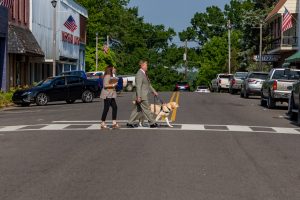 “I kicked out the window of the courthouse,” Mitch recalled, chuckling, “I kicked a football through it and Mike got blamed for it. I ended up taking responsibility, but when people came running out of the courthouse, the first person they pointed fingers at was Mike Oakley, because he was there, and they were sure it was him behind it.”
“I kicked out the window of the courthouse,” Mitch recalled, chuckling, “I kicked a football through it and Mike got blamed for it. I ended up taking responsibility, but when people came running out of the courthouse, the first person they pointed fingers at was Mike Oakley, because he was there, and they were sure it was him behind it.”
“So, they were close,” Stephanie continued, “Mitch’s dad was the quarterback for West Blocton, and Mr. Oakley played for Bibb County. They were friends. There are three generations of friends who grew up together. It’s just all part of a small town. But you just don’t see that very often, and I think that’s special.”
BV: What has your career as an attorney in Bibb County been like?
“In a small town you have to be able to do a number of things,” Mitch began, “I do a lot of criminal work, and I’m in a lot of domestic relations cases. But I also spend a lot of time between the two municipalities, West Blocton and Centreville, and I’m local council for the Bibb County Healthcare Authority. And I have a real estate practice doing closings and title work.”
He’s a very busy guy.
“I have good people working for me that keep me on my toes. Law practice has become very specialized, but that’s mostly people working off in larger cities. I often wonder what that would be like. But there’s a lot to be said about knowing a little about everything. We get all kinds of requests when people come in.”
BV: You remind me of the old-school small-town doctor that hangs a shingle out and everyone comes to them for everything. That’s a small-town thing you don’t find in big cities. Having an attorney that operates the same way, being all things for all people, can be a comforting asset to the community.
“A unique thing about Centreville,” Mitch related, “is that the little Christian bookstore next to the Presbyterian church used to be Dr. Cooper Nicholson’s office. He was blind. He was blinded in a hunting accident and continued to practice medicine in Centreville. He did a lot of listening…he’d put the stethoscope all over you to figure out what was going on. He practiced medicine for years here without vision. I remember in 1974 when I came back here, I had to get a football physical, and Dr. Nicholson is the one who performed the physical. I’m not sure when he retired, but you know, years later I end up having this accident and then Centreville has a blind lawyer.”
BV: What does the future hold for you, career or otherwise?
“I love to work. If I were retired, I’d be bored. I enjoy getting up and coming down here every day and interacting with people and doing what I can to serve,” he said.
“Mitch will probably work until he absolutely cannot, because he loves it. And that’s a good thing,” Stephanie smiled.
A good thing, indeed, for all of us.

